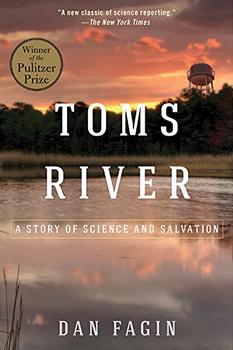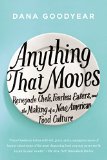Summary | Excerpt | Reviews | Beyond the book | Read-Alikes | Genres & Themes | Author Bio

How the Food Giants Hooked Us
by Michael MossI can see you rolling your eyes already. "Yes," you say, "I know that too much salt, sugar and fat are bad for me." After all, you've probably at least come across Michael Pollan's commandment: "Eat food. Not too much. Mostly plants." You don't really need to read another killjoy volume, you think. Well, think again. The absolutely brilliant Salt Sugar Fat: How the Food Giants Hooked Us is a well-researched and well-reported book that despite its loaded subject, doesn't sound preachy and never wags its finger at you, the end-consumer.
As someone who has read all of Michael Pollan's books and religiously followed Mark Bittman's food columns in The New York Times, I picked up this book rather hesitantly. Mostly I was afraid it would regurgitate material I had heard many times before – and initially it does. To be fair, though, the groundwork does need to be laid, and the basics have to be stated again, in order for Salt Sugar Fat to work. But what is especially fascinating about Michael Moss's new book is its strict adherence to its subtitle. It shows us how the food giants play the game – and in doing so, it's a masterful work of high-quality reporting.
Moss spent more than three years interviewing top executives, food scientists, government employees, packaging technicians, and many bright, talented people who give their best to the food companies they work at. The result of all this work and extensive research is a penetrating insight into the mechanics of customer manipulation. Contrary to the title, the book is arranged as Sugar, Fat, and then Salt, and in each section Moss shows us how the food giants manipulate their products to achieve one primary goal above all else: profits.
Should we be surprised that companies lust after profits? Of course not. That would be too naive. The very existence of corporations depends on their balance sheets, the healthier, the better. So while the fact that food companies crave only profits overlooking everything else is hardly revelatory, the many insidious ways in which our taste buds are actually manipulated is quite a surprise. When it comes to sugar, for example, the food scientist Howard Moskowitz discovered that the more sugar a food has, the more of it the consumer will eat. More eating = more sales. There is a dropoff point, however, where the addition of more sugar will actually make a consumer eat less. So the maker of say, Coca-Cola needs to find this cutoff point – the tip of the curve where sales will be the maximum. That term is called the bliss point. "That's a great name. It's just so sexy. What are you going to call it, the 'optimum sensory liking?'" Moskowitz asks.
Incidentally this same man is also responsible for the infinite number of varieties we have of each food in the grocery store. Moskowitz's groundbreaking consumer preference studies showed that different customers gravitate towards different tastes even in the same category of product. Some customers might prefer a dark French roast in coffee, for example, while yet others might like a milder version. "That's when you started to get seven different kinds of vinegar and fourteen different kinds of mustard and seventy-one different kinds of olive oil," Moss writes. It is important to state here that Moss doesn't demonize the people at the companies for creating processed foods. He makes it clear that for them, this was just another job. What is interesting is that most of these executives will not eat the foods they sell. Here alone is a stinging example of the problems pervading the poor. Sure, one can argue, Americans are becoming increasingly conscious of what they eat and from where it comes. But the ubiquity of processed foods especially in inner-city urban centers and the relentless marketing juggernaut behind them pretty much ensure that these foods are not disappearing from our supermarket shelves any time soon. Until then, all we can do is be aware not just of the hazards of eating too much of any one thing but also of the marketing techniques we are all subjected to (I for one don't remember much about any Super Bowl but I do remember the Doritos commercials).
I don't want to give away any of the "I didn't know that" moments you'll doubtless encounter while reading this book – mainly because I want you to read this book. There are times when Moss gets repetitive when he is trying to explain a new concept or idea. But this is a minor flaw in a book that should be essential reading for all.
The day I finished Salt Sugar Fat was when the New York Supreme Court ruled that then Mayor Michael Bloomberg's ban on supersized sodas was unconstitutional. Whatever one might think about the ex-mayor's techniques, Moss shows us that countries like Finland have achieved remarkable reductions in deaths from strokes and other diseases by regulating salt. The lesson from Finland, Moss says, is that it is possible to regulate salt (and maybe even sugar and fat) and save lives while still maintaining company profits.
Years ago, Michael Moss's reporting on hamburger safety and the beef processing industry (Moss can be credited with the phrase 'pink slime') earned him a Pulitzer. His eight-year old son used to love hamburgers, but doesn't anymore, Moss says. When Will learned about Moss's latest reporting adventures and they started chatting about Oreo cookies, he moaned: "Dad! You're not going to write about sugar now!" Poor Will. You can sort of see his point. "I did, Will. Sorry," says Moss in the book's acknowledgements. And we're sure glad he did.
![]() This review was originally published in The BookBrowse Review in April 2013, and has been updated for the
March 2014 edition.
Click here to go to this issue.
This review was originally published in The BookBrowse Review in April 2013, and has been updated for the
March 2014 edition.
Click here to go to this issue.

If you liked Salt Sugar Fat, try these:

by Dan Fagin
Published 2015
The riveting true story of sixty years in the life of a small town ravaged by industrial pollution, Toms River melds hard-hitting investigative reporting, a fascinating scientific detective story, and an unforgettable cast of characters into a sweeping narrative.

by Dana Goodyear
Published 2014
Anything That Moves is a highly entertaining, revelatory look into the raucous, strange, fascinatingly complex world of contemporary American food culture, and the places where the extreme is bleeding into the mainstream.
Your guide toexceptional books
BookBrowse seeks out and recommends the best in contemporary fiction and nonfiction—books that not only engage and entertain but also deepen our understanding of ourselves and the world around us.